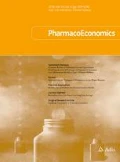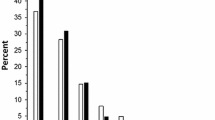Abstract
Background: Chronic diseases and their treatments may cause symptoms that impair performance but are too mild to affect outcome measures such as absences and workforce exit.
Objective: To assess the effect of type 2 diabetes mellitus on individuals’ productivity when working, absences from work and the value of any lost work time.
Methods: Subjects were identified from claims data and enrolled over the phone. A telephone survey was used to elicit information about productivity at work, absences, diabetes history, comorbidities, job characteristics, employment history, demographics and healthcare utilisation. The sample consisted of 472 employed residents of New York state, USA, of whom, 445 worked at one major US corporation. Of the 472 participants, 78 had type 2 diabetes. All participants agreed to release their claims data for this study; participants with diabetes also consented to the release of clinical records. All data were linked at the individual level.
Tobit regression was used to model work efficiency losses, the total productivity time lost and the value of that time. Absences were modelled using Poisson regression. Productivity was measured using absences from work and work efficiency. Work efficiency was assessed using the Osterhaus model.
Main outcome measures and results: Using the Osterhaus model of work productivity, type 2 diabetes was associated with a reduction in productivity at work. These productivity losses increased with the length of exposure to diabetes. Surprisingly, higher productivity losses among employees with diabetes did not translate into significantly higher productivity costs because the group with diabetes earned less. This likely reflects the prevalence of diabetes in populations. Among salaried people, very few reported working extra hours to make up for reduced productivity. Self-report biases may have been a factor in this finding. Type 2 diabetes was not associated with more frequent absences. Other factors that have strong effects on work efficiency are depression and colds, and job satisfaction.
Conclusions: People with type 2 diabetes appear to experience incremental decrements in work performance that may affect their current and future health and performance. Lower incomes of participants with diabetes suggest that both people with diabetes and their employers bear the cost of any work efficiency losses.






Similar content being viewed by others
Notes
Increased screening and changes in diagnostic criteria may have contributed to the rise in prevalence. Yet an actual increase in the existence of the disease is suspected and supported by the rising prevalence of diabetes risk factors (e.g.obesity, sedentary lifestyle), and a decrease in mortality from coronary artery disease.
References
Kenny SJ, Aubert RE, Geiss LS. Prevalence and incidence of non insulin-dependent diabetes. In: National Diabetes Data Group, editors. Diabetes in America. Bethesda (MD): National Institutes of Health, 1995
American Diabetes Association. Direct and indirect costs of diabetes in the United States in 1992. Alexandria (VA): The American Diabetes Association, 1992
Olivera AM, Duhalde EP, Gagliardino JJ. Costs of temporary and permanent disability induced by diabetes. Diabetes Care 1991; 14 (7): 593–6
Gerich JE. Glucose counterregulation and its impact on diabetes mellitus. Diabetes 1988; 37 (12): 1608–17
Testa MA, Simonson DC. Health economic benefits and quality of life during improved glycemic control in patients with type 2 diabetes mellitus: a randomized, controlled, double-blind trial. JAMA 1998 Nov 4; 280 (17): 1490–6
Ware JE, Kosinksi M, Keller SD. SF-36 physical and mental health summary scales: a user’s manual. Boston: New England Medical Center. Health Institute, 1994
Gilmer TP, O’Connor PJ, Manning WG, et al. The cost to health plans of poor glycemic control. Diabetes Care 1997 Dec; 20 (12): 1847–53
Toyota Manufacturing, Kentucky, Inc. v. Williams, 534 U.S. No. 00-1089, 567 (2002).
Chevron USA Inc. v. Echazabal, 536 U.S. No. 00-1406, 536 (2002)
Lavigne JE. Diabetes, work productivity, housework and social participation [dissertation]. Rochester (NY): University of Rochester, 2001
Osterhaus IT, Gutterman DL, Plachetka JR. Healthcare resource and lost labour costs of migraine headache in the US. Pharmacoeconomics 1992; 2 (1): 67–76
van Roijen L, Essink-Bot ML, Koopmanschap MA, et al. Labor and health status in economic evaluation of health care: the health and labor questionnaire. Pharmacoeconomics 1995; 7 (2): 170–9
Morgado A, Smith M, Lecrubier Y, et al. Depressed subjects unwittingly over-report poor social adjustment which they re-appraise when recovered. J Nerv Ment Dis 1991; 179: 614–9
Berndt ER, Finkelstein SN, Greenberg PE, et al. Workplace performance effects from chronic depression and its treatment. J Health Econ 1998; 17: 511–35
Acknowledgements
The Agency for Healthcare Research and Quality funded this work through a dissertation grant (R03 HS09891-01).
David Weimer, Ph.D, of the University of Wisconsin-Madison, Madison, Wisconsin, USA, provided advice regarding the design, methodology and presentation of this work. Sarah Trafton, JD of the University of Rochester, Rochester, New York provided helpful comments on the dissertation that preceded this report. Steve Wittlin, MD opened his practice for subject recruitment.
The authors have provided no information on conflicts of interest directly relevant to the content of this study.
Author information
Authors and Affiliations
Corresponding author
Rights and permissions
About this article
Cite this article
Lavigne, J.E., Phelps, C.E., Mushlin, A. et al. Reductions in individual work productivity associated with type 2 diabetes mellitus. Pharmacoeconomic 21, 1123–1134 (2003). https://doi.org/10.2165/00019053-200321150-00006
Published:
Issue Date:
DOI: https://doi.org/10.2165/00019053-200321150-00006




